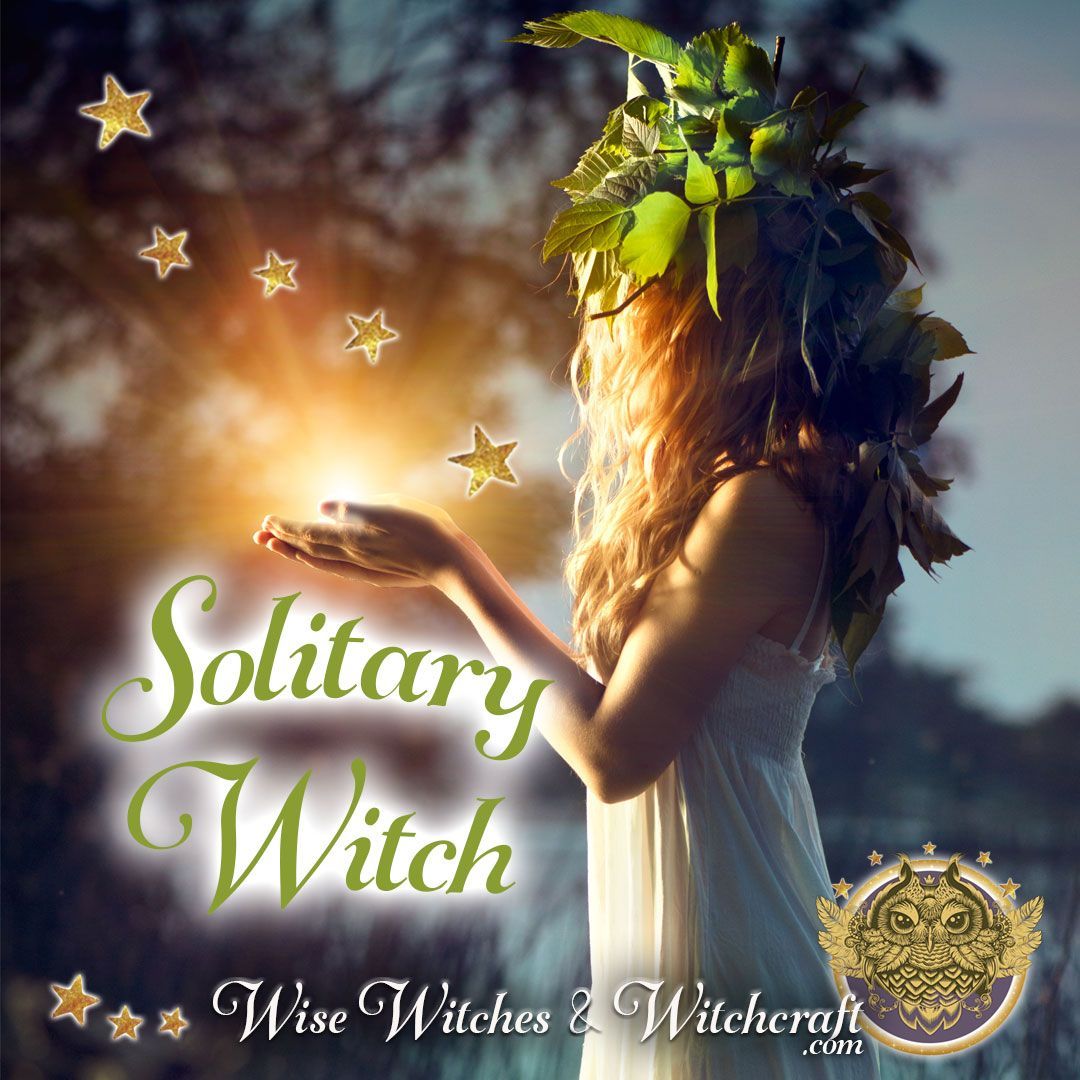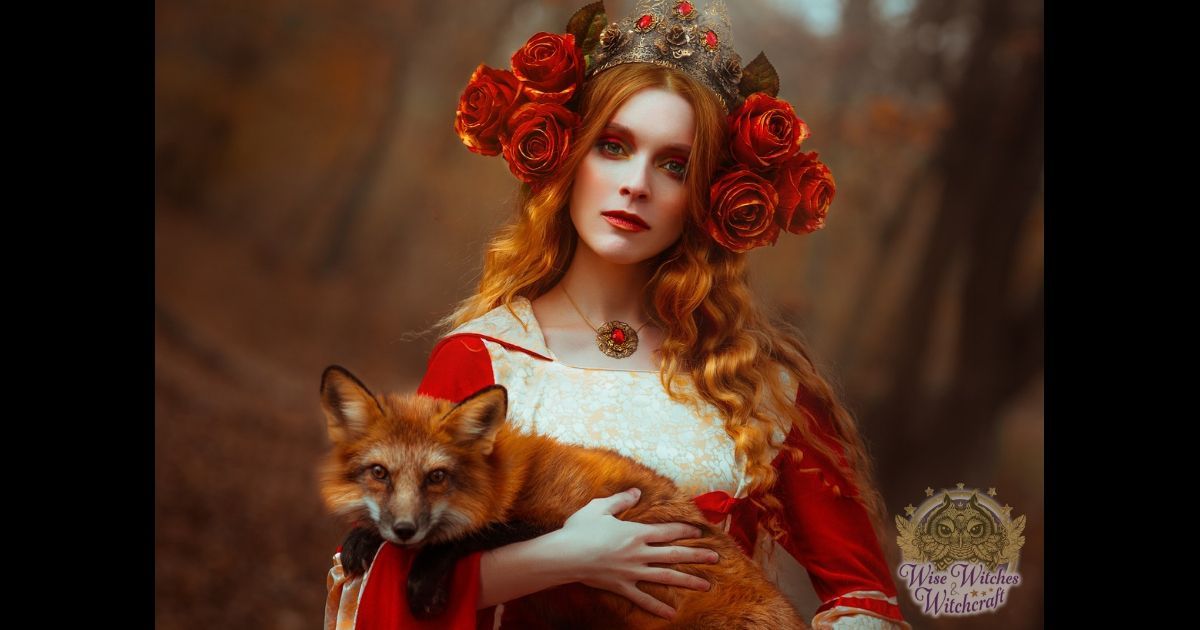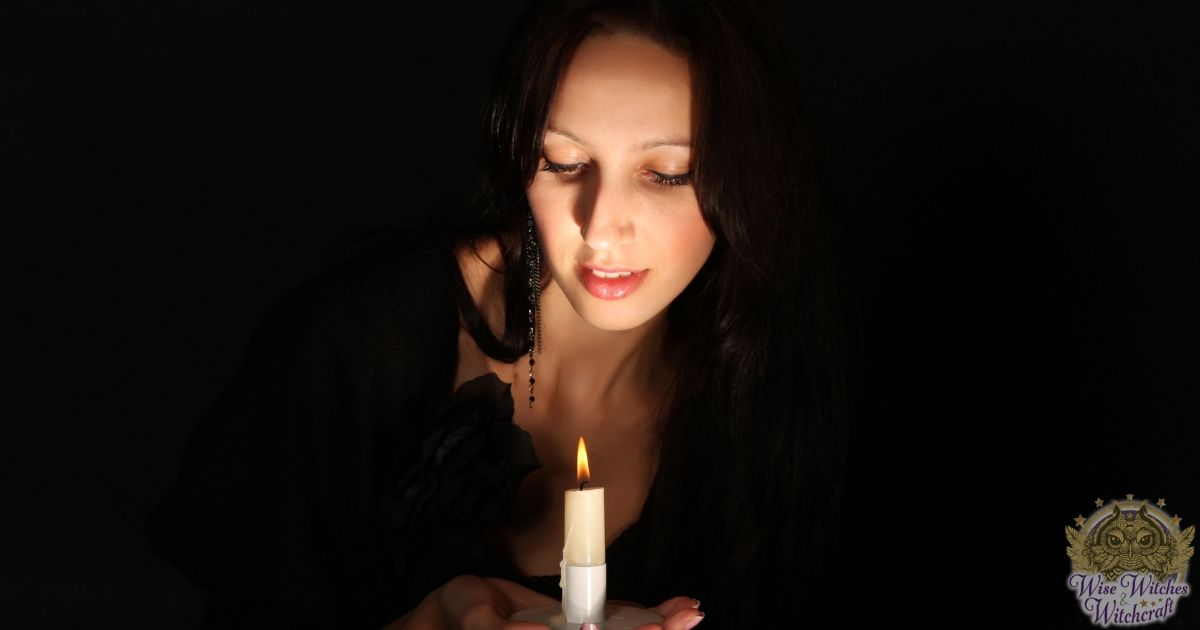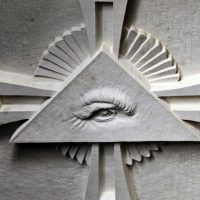Solitary Witch

“When I am alone, it brings me great delight. That’s because it is fun, informative, and ambitious in scope, a comprehensive encyclopedia of all things magickal, and I can get lost in it for hours at a time by merely flipping to some random page and starting from there.”
-Silver Ravenwolf
What is a Solitary Witch or Wiccan? Quite simply this is a practitioner of magic who chooses to go it alone. There is a lot of reason why someone becomes a Solitary Witch. Perhaps they are too far from a group to make attending practical. Others may find that they prefer a one-on-one connection with magical energy and the Divine. Others still had unpleasant experiences with other Witches or covens and decided to avoid all the drama and go it alone.
How “Solitary” is the Solitary Witches’ Path

The struggle for many Solitary practitioners is that having time with other Witches could dramatically help them explore magic and spirituality more extensively. For this reason, many solitary Neo-Pagans and Witches of various traditions participate with a group for special events. The Solitary Witch reviews various groups as a guest before joining any ritual formally, and asking permission is a great way to open doors.
For the person who just doesn’t “do” groups well, at least face to face, there is the world of Techno Witches and Pagans to explore. Online communities, covens, information on various traditions, lessons on spellcraft and candle magic and so much more are only a mouse click away. Not all the information on the web is accurate, of course. As a result, practicing due diligence underlines the Solitary Wiccan’s private research.
Do I need Special Training to be a Solitary Witch?

In short, no. Getting some training is recommended in neutral environments. You might go to a local workshop on crystals or divination, for example. Or attend a class that teaches basic spellcraft. In these settings, you meet practitioners from many magickal walks of life. Statistically about half of them will also be Solitary practitioners. Other options for gathering magical knowledge as a Solitary Wiccan include books, videos and perhaps even a one-on-one conversation with a Witch whose practices interest you.
Among staunch Traditional Wiccans, Solitary Practice is somewhat frowned upon. Having no initiation or structured teaching goes against the grain of their fundamental practices. To them, the approach lacks commitment and authenticity. We would say that Solitaries have to be deeply committed because learning magic alone takes dedication.
Additionally, various magical leaders like Ray Buckland and Doreen Valiente advocate the idea that self-initiation is perfectly acceptable. After all, dedicating yourself to a specific Higher Power is incredibly personal, to begin with. Your promises are between you and the Divine. It’s really no one else’s business unless you chose to share. Remember that anyone who approaches the magical arts with sincerity and respect can undoubtedly discover a means for practicing responsibly.
Do Solitary Witches follow Specific Traditions?”

Yes and no. Because of the personalized nature of Neo-Pagan practices in the broadest sense of the term, even tried-n-true tradition has individual elements unique to the practitioner. So, for example, a Solitary practitioner might choose studying Seax Wicca as a foundation for their practices because it was devised with both groups and individuals in mind. On the other hand, individuals may choose to cobble together meaningful beliefs and practices from several sources, ending up with a path that is wholly unique and their own creation. Both approaches are perfectly viable.
Help and Hints for Solitary Wiccans

When you’re starting on a Solitary Path, you’ll have hundreds of questions. You won’t answer them all quickly, but some suggestions can get you off on the right foot.
Hint for the Solitary Witch #1: Make sure you have a clear understanding of “why” you chose a solitary spiritual path. This creates a cornerstone for building your practices ethically. Throughout history, there have been monks, shamans, wise people and visionaries around the world who go off to be alone with the Universe, so you are in good company.
Hint for the Solitary Witch #2: Have a starting point. What are the “rules” necessary for your magical purpose and vision? What type of tools do you plan to use (and in what way)? If you find some of the magical communities ideas on what to say, what to do, and what to use too constraining look to folklore, myths, and practices of “cunning folk” for some inspiration.
Hint for the Solitary Witch #3: Borrowing and adapting ideas from various sources is really a tried-n-true custom among Solitaries. When you find something that truly sings the song in your soul – use it! Remember that meaningfulness is everything in magic.
Hint for the Solitary Witch #4: Consider keeping a diary or Book of Shadows where you can detail what worked, what didn’t and what you want to try next. If you come up with an observance you like, write down the basic elements of it so you can use it again, or at least that framework.
Life Hint for the Solitary Witch #5: Practicality is your friend. If you have a small space, you can’t have a HUGE altar. If you live in a house with several people, having a sacred sword might not be a great letter of introduction to your beliefs. Oh, and please don’t burn down the curtains when you are doing candle magic (don’t laugh, it happens). When you are on your own, the responsibility for your tools and how you use them is wholly in your hands.
Hint for the Solitary Witch #6: Bigger is not always better. There is a temptation among all magical practitioners, particularly novices, to get the next wondrous “shiny thing” that comes into the New Age market. It’s kind of like wanting the next version of your cell phone when the one you have is perfectly fine. Ask yourself if you really need it, and for that matter what place it would take in your spiritual environment.
[wisew_rectangle_large align=”right”]
Hint for the Solitary Witch #7: Keep it real. If you run into someone and share a peek at your processes, don’t forget to tell them where you got that inspiration. When we “borrow” we should also give due accreditation.
Hint for the Solitary Witch #8: Celebrate your progress and take note of your shortcomings. Continue challenging yourself so your spiritual progress doesn’t stagnate. There is a reason that magic is called a “practice.” Don’t get discouraged if proverbial sparks aren’t flying out of your wand in a few days. You are going to make mistakes like all of us, so get over it and try again.
Hint for the Solitary Witch #9: Know yourself. It doesn’t matter how great “Joe’s” spell manifests, what matters is that you stay true to your heart. Solitary practice is not about “keeping up” with anyone’s expectations other than your own. Don’t try to run when you still need help walking.
Hint for the Solitary Witch #10: Perhaps most importantly enjoy yourself. Being a Solitary Witch gives you plenty of opportunities for self-empowerment and appreciation. Embrace them!
Discover Other Types of Wicca Traditions

Alexandrian Wicca Tradition: Alexandrian Witchcraft, or Alexandrian Wicca began in the 1960s, founded by Alexander Saunders and his wife. This magical tradition has similarities to Gardnerian and remains a well-recognized Wiccan path.
Blue Star Wicca Tradition: The Blue Star Wiccan coven began in 1975. Considered an Eclectic Wiccan group, there are recognizable elements of both Alexandrian and Gardnerian Wiccan paths in this practice. Musical Pagans may enjoy the Blue Star liturgical music Moon Hooves in the Sand (1983).
Celtic Wicca Tradition: Celtic Wicca traces many of its practices to ancient Scotland, Ireland and Wales. This magical tradition overflows with folklore and “old world” magic. If the sound of bagpipes makes your heart flutter, read more and see if you might be a Celtic Witch.
Dianic Wicca Tradition: Dianic Witches emphasize the Goddess and many feminist ideals. Dianic Wiccans combine Italian folk magic and healing practices with parts of British Traditional Wicca. Practitioners use magic, meditations, spells, and visualizations in their workings.
Eclectic Wicca Tradition: Eclectic Wiccans are the “freestylers” of magical methods. This magical path seeks out underlying truths and inspiring practices from many of the worlds spiritual and religious traditions. From this gathered knowledge they devise a highly personal practice.
Gardnerian Wicca Tradition: Considered the first devised Wiccan tradition started by Gerald Gardner. This is an oath-bound initiatory magical path, organized in covens with a Priest and Priestess presiding. Gardnerian Wiccans often have strong ties to British Traditional Wicca.
Georgian Wicca Tradition: Similar to British Traditional Wiccan groups, Georgian Wicca was founded by George Patterson III. In 1971 Georgian Wicca had a charter through the Universal Life Church. The New England Covens of Traditionalist Witches assisted in formalizing this Tradition further.
[wisew_rectangle_large align=”left”]
Green Wicca Tradition: Green Witches are environmentally-aware practitioners. They have a strong connection to Earth and the living energy of the Universe. Green Wiccans practice a variety of nature-oriented magic methods including spells and divination.
Pictish Wicca Tradition: Pictish Witchcraft begins in old Scotland with a strong focus on nature. Considered more a magical path than a religious practice, this is most Pictish Wiccans are Solitary Witches. Divination and Meditation also figure heavily into the Pictish Witch’s methods.
Seax Wicca Tradition: Seax Wicca derives inspiration from Anglo-Saxon Paganism. Founded in 1973 by Raymond Buckland, Seax Wiccans can self-initiate, and coven structures are democratic in nature. A sacred Spear and Runes are two of the most important tools in this type of Witchcraft.
Traditional Wicca Tradition: The Traditional Witch relies heavily on the history and folklore of our ancestors who practiced magic in simple, but effective ways. Traditional Witchcraft includes many familiar elements of Wicca and Paganism but is really neither. Some Traditional Witches have family or coven ties that guide their beliefs.




